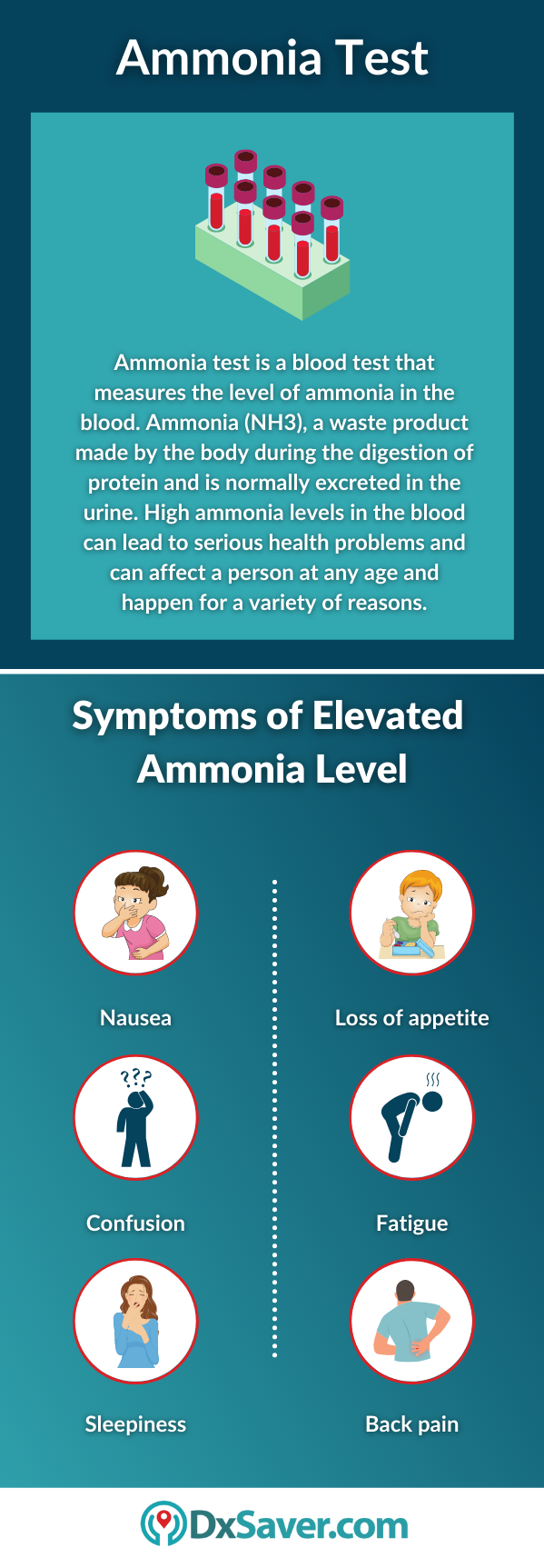
Ammonia is also known as NH3 is a waste compound that is normally excreted in the urine. This can be poisonous to the cells and an elevated blood ammonia level can affect the entire body. The ammonia test is a blood test that measures the level of ammonia in the blood. An ammonia test can be ordered when you experience symptoms of an elevated ammonia level like mental changes, sleepiness, change in consciousness, or coma. Ammonia levels rise when the liver is not able to convert ammonia to urea. For this test, the sample can be taken from either a vein or an artery.
This article covers all the significant topics related to ammonia tests such as the test cost, preparation for tests, risk factor, and how to get tested for an ammonia test.
- What is an ammonia test?
- Why it is done?
- What happens during an ammonia levels test?
- How should you prepare?
- Risk of this test
- What do the results mean?
- Symptoms of excess ammonia
- Complications of elevated blood ammonia level
- How is elevated blood ammonia level treated?
- Provider locations
For our readers who are interested in knowing the ammonia test cost beforehand, we begin with that section.
How much does the ammonia test cost?
Ammonia test costs range from $64 to $99 in different labs and facilities across the US. Prior appointment isn’t required. You can order tests online by comparing the price or visiting the nearest lab during lab business hours. You will get the results in your email in 2 to 3 business days after completing the procedure. Apart from this, doctor consultation is available for any kind of further treatment or medical advice.
The table below shows the ammonia test provider and their prices. You can know more and book the test by clicking on the “Book Now” button.
Name of our Partner Labs | Book Online at Offer Price |
HealthLabs
| $99 |
Personal Testing Lab
| $64 |
Ammonia test cost with insurance
Many insurance companies in the U.S. cover all the vital tests like an ammonia test. However, the coverage provided by private health insurance companies and national health insurance programs like Medicare varies widely. Most of the health insurance policies cover ammonia test costs only once or twice a year and when your physician orders more than twice in a year, you should pay the test cost out of pocket. So, you are recommended to check if your health insurance policy covers the ammonia test cost.
Our ammonia testing providers do not accept any kind of health insurance policy. However, they can provide you with an itemized receipt containing all the details viz the name of the test, code of the test, and CPT code which is necessary for insurance reimbursement purposes.
What is an ammonia test?
Ammonia test is a simple blood test that measures the level of ammonia in a blood sample. Ammonia or NH3 is a waste product formed by bacteria in the intestines during the digestion of protein. The excess ammonia can accumulate in the blood when it is not processed and cleared from the body properly. The liver converts ammonia into urea and is then eliminated in urine. When the liver is not able to convert ammonia to urea, the ammonia levels in the blood increase. But when a person has certain health conditions like liver or kidney failure, their body cannot make or get rid of urea. This can cause extreme tiredness, confusion, and in some cases, coma or even death.
Why it is done?
- To check how the liver is working, particularly when signs like hand tremor, confusion, excessive sleepiness, coma are present.
- To diagnose hepatic encephalopathy. This is a condition that occurs when the liver is damaged (severely) to properly process ammonia.
- Identify a childhood disorder called Reye syndrome. This condition can damage the liver and the brain. And testing can also help predict the outcome of a diagnosed case of Reye syndrome.
- To diagnose urea cycle disorders. A rare genetic defect that affects the body’s ability to change ammonia into urea.
- Helps to predict the outcome of a diagnosed case of acute liver failure.
- Helps to check the level of ammonia in people who receive high-calorie intravenous (IV) nutrition.
- Check the success of treatment for a severe liver disease like cirrhosis.
What happens during an ammonia levels test?
A health care professional or lab tech will take a blood sample from a vein in the arm by using a small needle. A small amount of blood will be collected into a test tube after inserting the needle. And it is common to feel a little sting when the needle goes in or out. Usually, it takes less than five minutes for this test.
And in the case of a newborn, the health care provider will use alcohol to clean the baby’s heel and poke the heel with a small needle. And they will put a bandage on the site after collecting a few drops of blood.
How should you prepare?
You shouldn’t smoke cigarettes exercise or for about 8 hours before the test. It is important to tell the doctor about all medicines, aspirin, over-the-counter medicines, herbs, vitamins, and supplements you take. Your doctor may ask you to stop taking some drugs which might affect the results of the test. It includes acetazolamide, barbiturates, diuretics, narcotics, valproic acid, and alcohol. And there are no special preparations for babies before the test.
Risk of this test
There is little chance of having a problem with this blood test. When a blood sample is taken, a small bruise may form at the site, but most symptoms go away quickly.

What do the results mean?
If the results are not normal, the health care provider may order more tests to find out the reason for the high ammonia levels. And the treatment plan will depend on the specific diagnosis.
Normal Results
The normal level is 15 to 45 µ/dL or 11 to 32 µmol/L. It is important to note that the normal value ranges may vary slightly among different labs. And few labs use different measurements or test different samples. The doctor will also look at the results based on age, health, and other factors. Because the value that is not in the normal range may still be normal for you.
Abnormal Results
The blood ammonia level is high when the kidneys or liver are not working properly and allowing waste to remain in the bloodstream. Ammonia like other waste products in the body can be poisonous to the cells, and high ammonia levels in the blood can lead to serious health problems. Although high ammonia levels may sometimes point to either liver or kidney disease, several other things can cause higher ammonia levels. They may include:
- Bleeding in the stomach, intestines, esophagus (or other parts of the body)
- Tourniquet use can increase the level of blood ammonia
- In muscular exertion, the muscles produce ammonia when active and absorb it when resting
- High protein intake might trigger ammonia accumulation in some patients
- Very high ammonia levels can occur in premature babies with respiratory distress (rare)
- Use of certain drugs like alcohol, narcotics, diuretics, high-dose chemotherapy, or valproic acid
- Cigarette smoking
High levels in infants may indicate impairment of the urea cycle due to a rare genetic disorder such as a deficiency of one of the urea cycle enzymes or may be seen with hemolytic disease of the newborn. Moderate and temporary increases in ammonia are common in newborns. And the level may rise and fall without noticeable symptoms.
Symptoms of excess ammonia
Symptoms of elevated blood ammonia may occur frequently or just occasionally. Symptom may include:
- Fatigue
- Loss of appetite
- Nausea with or without vomiting
- Pain in the back, sides, or abdomen
- Hand tremors
- Mental changes, disorientation
- Sleepiness
- Change in consciousness
- Coma
- Confusion
Complications of elevated blood ammonia level
In some cases, complications of poorly controlled or untreated elevated ammonia levels can be serious and even life-threatening. It may include:
- Encephalopathy
- Organ failure
- Dementia
- Swelling
- Unconsciousness and coma
So, it is essential to carefully follow the doctor’s recommended treatment plan to minimize the risk of serious complications.
How is elevated blood ammonia level treated?
As the buildup of ammonia in the bloodstream can have serious consequences treatment is necessary. The treatment aims to remove toxic body waste (ammonia) from the bloodstream. There are several ways to remove excess ammonia from the blood it may include:
- Dialysis, using devices such as artificial livers or dialysis in a hospital setting
- Liver or kidney transplant (very severe cases)
- Medications to convert ammonia into another molecule (L-ornithine-L-aspartate)
- Medications to reduce the level of ammonia in the blood or gastrointestinal tract (antibiotics – neomycin or special sugars – lactulose)
Elevated blood ammonia level may be mild enough that it will resolve on its own without any treatment in some cases (especially in infants).
You may be able to lower the risk by avoiding the use of drugs, alcohol, and tobacco, controlling blood pressure, and eating a low-protein diet when you have a history of liver disease.
Provider locations
An ammonia test can be done at any of our partners’ 4,500+ labs located across the US. To know the ammonia test cost, refer to the first section of the article.
Frequently Asked Questions
What is an ammonia blood test?
An ammonia blood test measures the level of ammonia in the blood. Ammonia is a waste product that is normally removed from the body by the liver.
Why is an ammonia blood test done?
An ammonia blood test is done to check for liver or kidney problems, or to evaluate the effectiveness of treatment for such problems. High levels of ammonia in the blood can indicate liver disease, kidney disease, or other metabolic disorders.
How is an ammonia blood test done?
An ammonia blood test is done by drawing a small amount of blood from a vein in your arm. The blood is then sent to a laboratory for analysis.
What do high levels of ammonia in the blood mean?
High levels of ammonia in the blood can indicate liver or kidney problems, or a genetic disorder such as urea cycle disorder. High levels of ammonia can also be caused by certain medications, infections, or malnutrition.
What do low levels of ammonia in the blood mean?
Low levels of ammonia in the blood are not typically a concern, but it may indicate a deficiency in certain vitamins and minerals, such as vitamin B6 and magnesium. If you have low levels of ammonia in your blood, you should contact your physician for further evaluation and treatment.
Other topics you may also be interested in:-
- Perimenopause Testing for Women
- Importance of Aldosterone to Renin Ratio
- What is Rheumatoid Arthritis?
- Statin Panel Blood Testing in the U.S.
- Causes and Symptoms of Zika Virus
- Herpes STD Testing Cost in the US
- What is a Titer Test?
- Importance of Occult in Blood
- Symptoms and Signs of Lactose Intolerance
- What is the Myasthenia Gravis Test?
- Dog Allergy Testing Cost in the US
- What is HCT in Blood Tests?
- Troponin Testing in the US
- Fibrinogen Test Cost in the U.S.
- Importance of ACTH Hormone in Blood
- MCV: Normal Levels, Importance and Testing
- Symptoms of Tay-Sachs Disease






